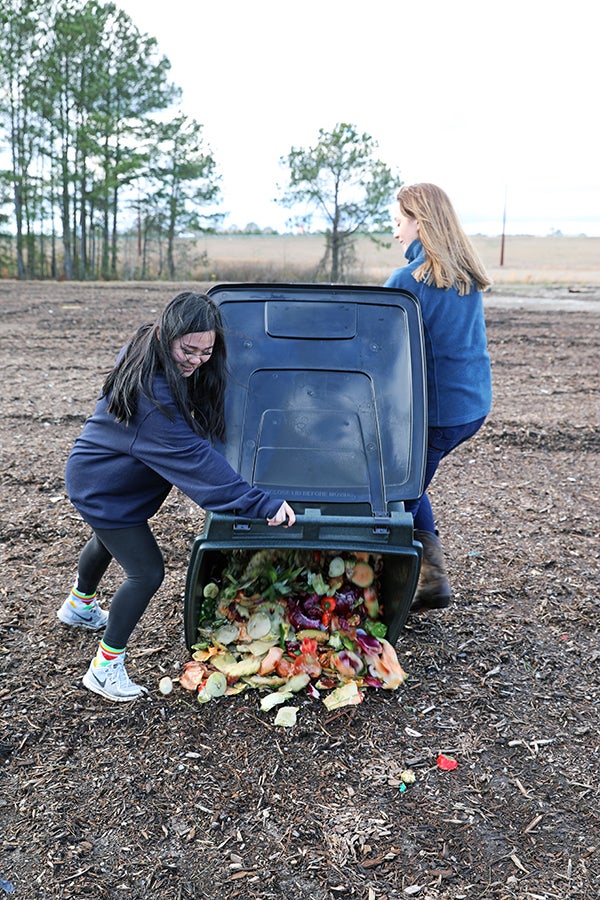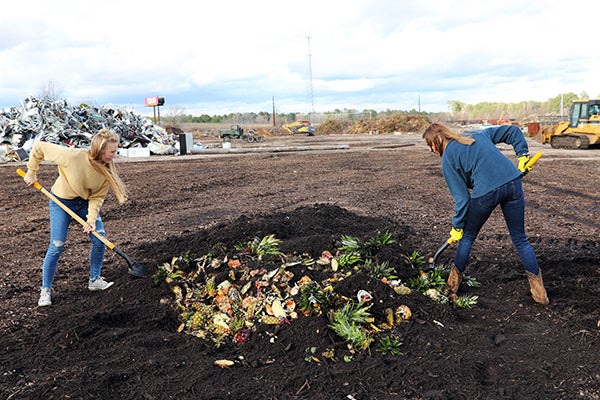Students seek to improve sustainability through composting
Improving Greenville’s environmental sustainability through compost is the goal for several East Carolina University students.
Olivia Sessoms, Loring Penna-Welch, Jacob Marshall and Hayden Murphy are four Honors College students who are working with the Innovation Design Lab (IDL) to create a composting business in Greenville.

Olivia Sessoms, left, and Loring Penna-Welch empty bins of organic waste during the creation of the compost pile at the Pitt County Transfer Station. (Photos by Kristen Martin)
They have partnered with ECU alumna Caitlin Cummins for this project. Cummins is pursuing her master’s degree online from Green Mountain College in Vermont and is leading the business.
The group, named Terra Bella Compost, wants to take organic food waste from ECU’s dining halls and convert it into a high-quality compost for gardeners and landscapers, thus helping the environment and reducing trash costs.
Currently, there is no facility in Greenville or Pitt County to handle the composting needs of ECU, much less the county.
The group had to do a significant amount of background work before hauling the first load of organic waste from ECU’s dining halls.
“The Terra Bella team is an example of the dedication these students have to team-building, hard work and doing what is right for our world,” said Wayne Godwin, IDL director. “They have worked for the past three years to build this project. When others can’t find a way, this team of students leaders is mapping a method to success for others to follow.”
The idea for the business stems from an IDL internship that Sessoms had at ThermoFisher Patheon two summers ago. The company was interested in going zero-waste and enlisted the students’ help to meet that goal.
“They noticed there was organic waste coming from their cafeteria,” Sessoms said. “We saw that they tracked it really well just to throw it away later. We were like, ‘What if you composted this?’”
After that summer, Sessoms worked with Cummins and another student to work out the details of the project before Cummins began creating the financial model.
Cummins had approached the city about composting before she knew about Sessoms’ team. For her thesis, she wanted to do a feasibility study on composting food waste at ECU. The sustainability manager at ECU introduced her to the IDL team.
“It was really good communication between the city and the school and the county,” she said.
According to Penna-Welch, a group of students in Honors 3000 was interested in composting at ECU but had planned on doing it in-house until they discovered how many regulations were involved. As a part of Honors 2000 and 3000, freshmen research “wicked” problems, which are social and cultural issues that are difficult to solve. Then they come up with ideas to attempt to solve these problems.
“This is something that we know ECU needs and the community needs, but it needed to be outsourced to another company, which is what we’re trying to do,” Sessoms said.
Group members completed the iCorps@ECU program, which helps ECU faculty, staff and students learn about how to launch a new company and supports them through the process. They also presented at Research and Creative Achievement Week where they won two awards.
“We were trying to prove that people would buy this compost and one consideration that we had to take was that we couldn’t rely on ECU as a source to buy the compost from us,” Sessoms said. “So, we had to see what the market for this compost was without one of the largest people who would be invested.”
Cummins said that they received support from many places, including from John Ciannamea, the interim director of Greenville SEED at ECU. He helped them to put their idea in a business perspective, which was a game changer.
“As I’ve learned throughout this, that is one of the biggest issues with composting businesses: People are so eager to divert food waste and make compost but then they don’t have a game plan of what they’re going to do with the compost,” Cummins said.
ECU Facilities Services is lending the group a truck to haul the compost while ECU Dining has provided the bins to store the waste.
According to Cummins, their group has been approached by a variety of people telling them how they had tried to get a similar project started for years.
“There was a lot of support within ECU to do the composting but with the legislation behind it and everything else that goes into it, it’s not really feasible to do it on campus or through the university,” Penna-Welch said. “It has to be done with the university as a partner.”
The group is utilizing two composting methods, windrows and aerated static piles (ASP).
“A windrow is a big pile that you have to turn, and an aerated static pile is a big pile that you don’t have to turn,” Cummins said.

Caitlin Cummins, left, and Loring Penna-Welch mix mulch with the organic waste in the compost pile at the Pitt County Transfer Station.
Pitt County Commissioners unanimously voted to grant Terra Bella Compost a permit to use two acres at the Pitt County Transfer Station to set up compost piles in January. Mulch will also be supplied to the group by Pitt County Solid Waste at no additional cost.
The group began the six-month pilot this semester and picked up its first load of organic waste on Feb. 7. During this pilot project, it will compost food waste from both dining halls and possibly coffee grounds from the Starbucks locations on campus.
Long term, the group hopes to turn this into a small business that will service an area 50-100 miles around the composting site at the transfer station and offer high-quality compost to gardeners and landscapers.
“We want to provide people with compost that is just from food waste,” Cummins said. “The only product I know of that’s available currently at local nurseries comes from Georgia or South Carolina and it’s expensive because they have to ship it up here. There’s nothing local so we would be able to offer that at a competitive rate.”
They have started to gauge interest from local restaurants and businesses as well.
“One of the other aspects of this business is tipping fees. People pay to have their trash hauled away currently to Bertie County,” Penna-Welch said. “That’s one of the biggest costs in hauling your waste nowadays or least in Greenville because it’s going so far away. We’re trying to compete with tipping fees.”
Schools are also a potential area for them to get organic waste.
“There are organizations that will come into schools and transition them into composting,” Cummins said. “There’s a lot of help out there which we’re finding. People are eager to do what they can to help the environment and we just have to help guide them.”
Working with local organizations also plays into another component of their project, which is education.
“It’s important to us that our business is teaching younger people and even just people in this area the importance of sustainability and that what they do actually matters and makes a difference,” Sessoms said. “We want to help cultivate the soil in this area and kind of encourage people to get their hands dirty. Then hopefully that can encourage more healthy behaviors, more use of the outdoors and soil and growing your own things.”
-by Kristen Martin, University Communications